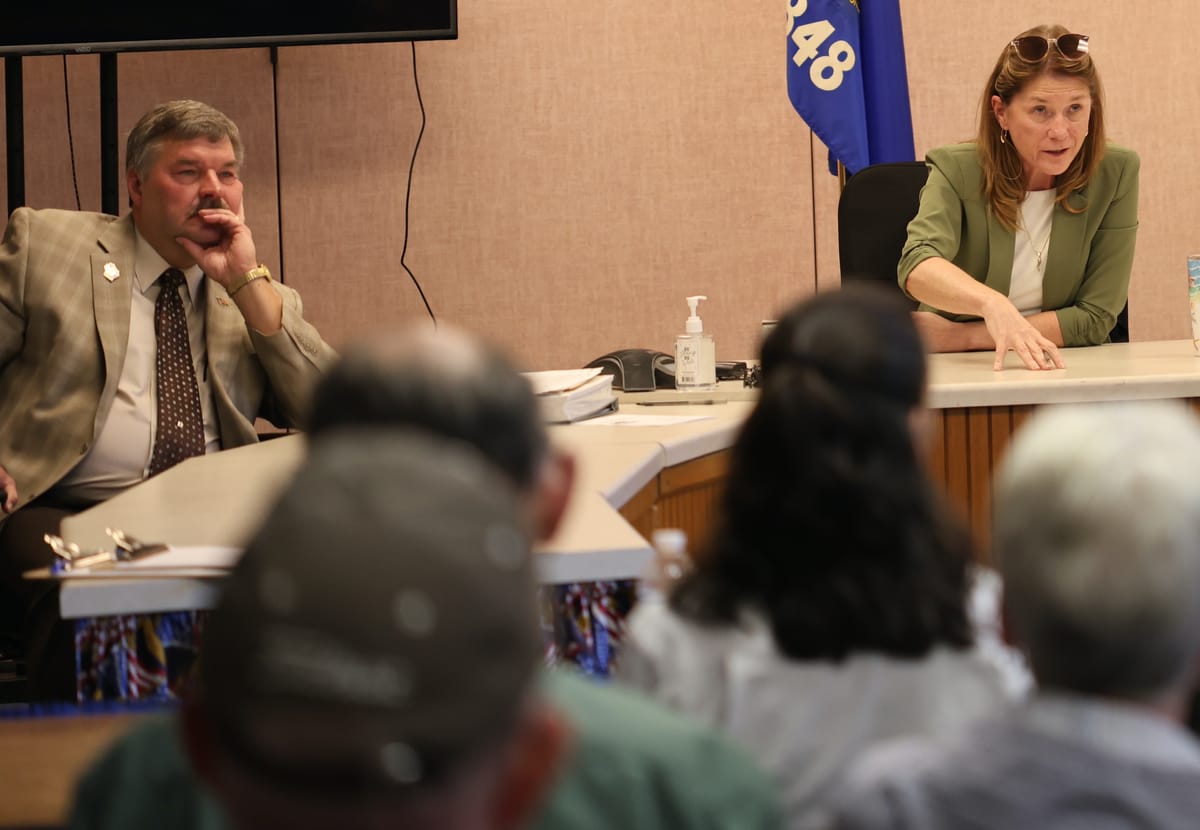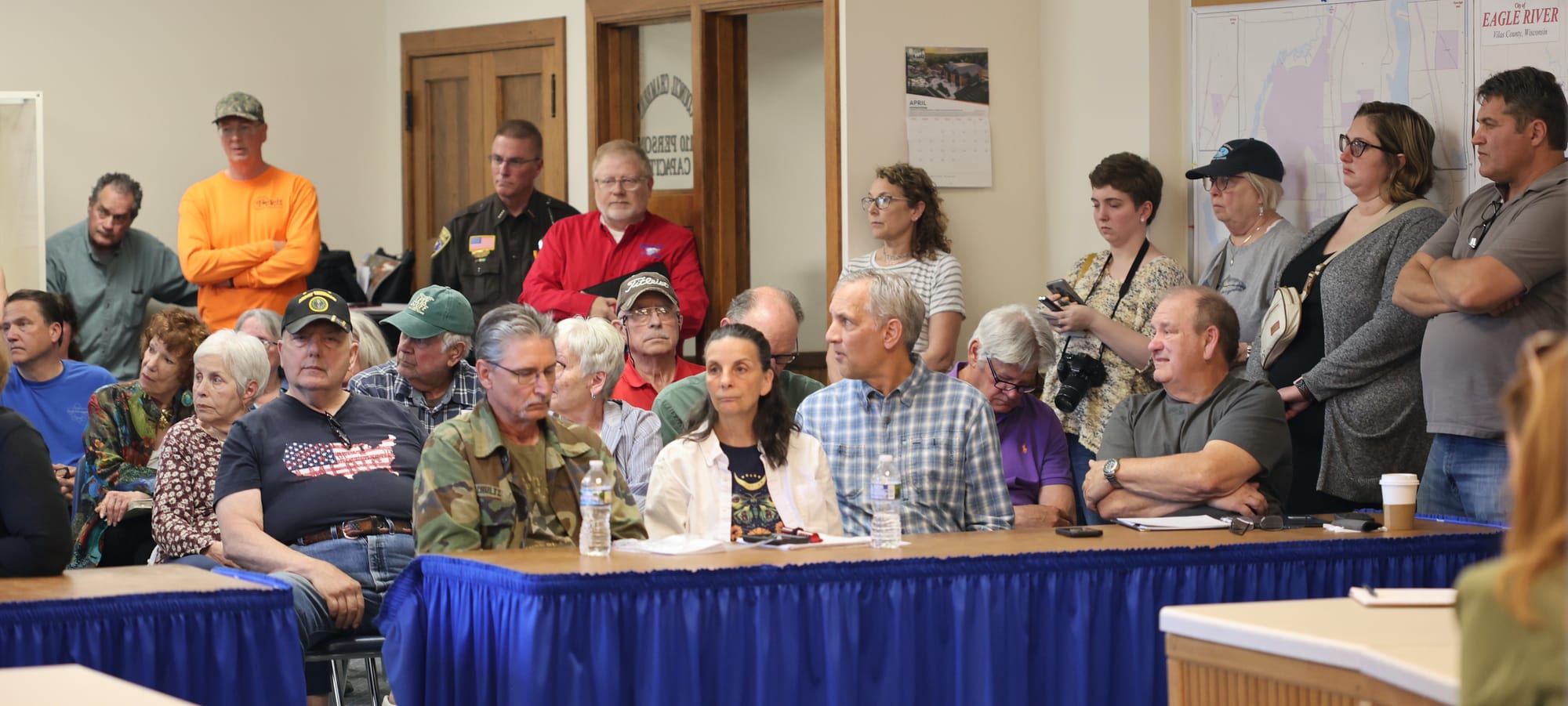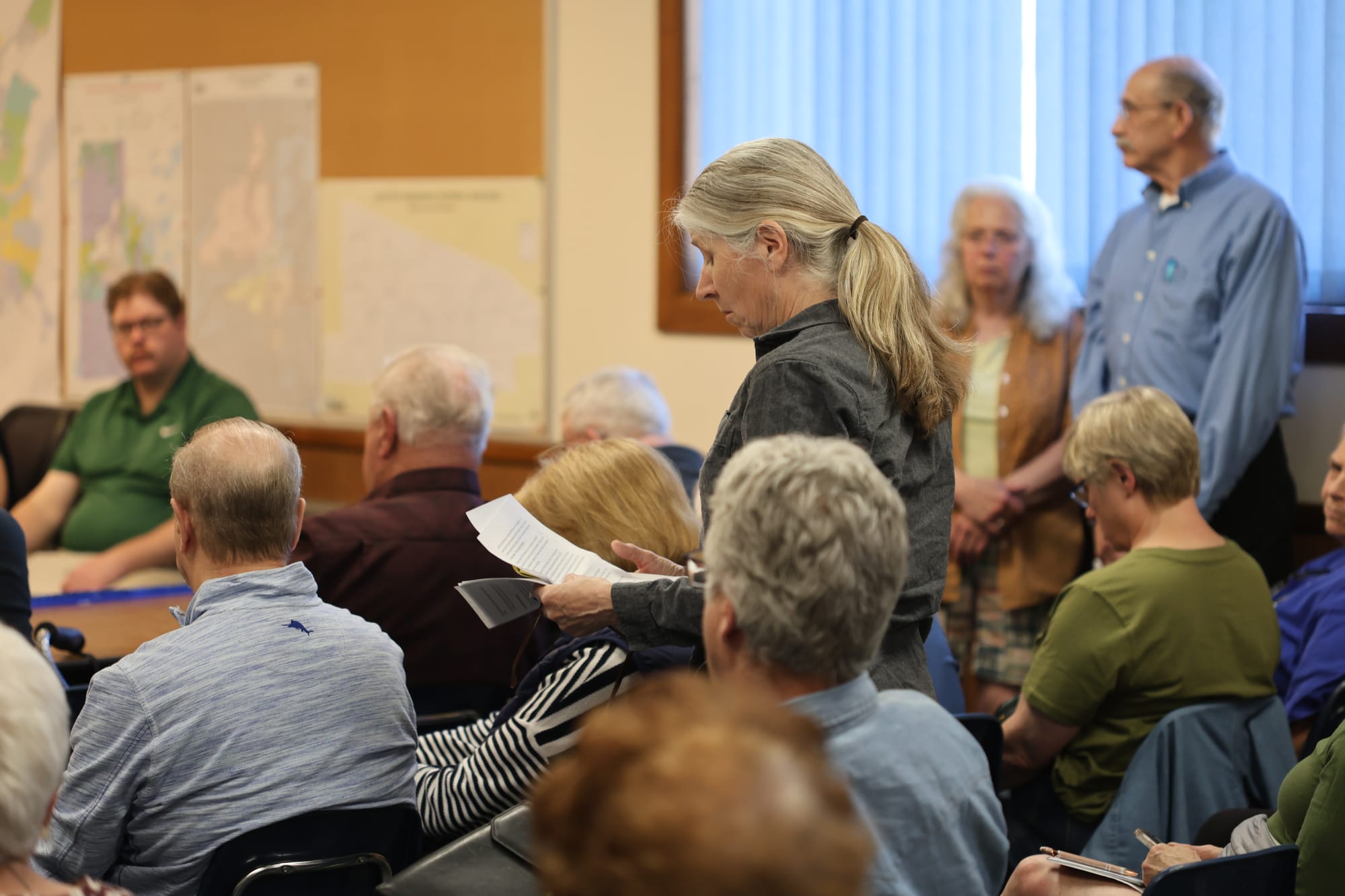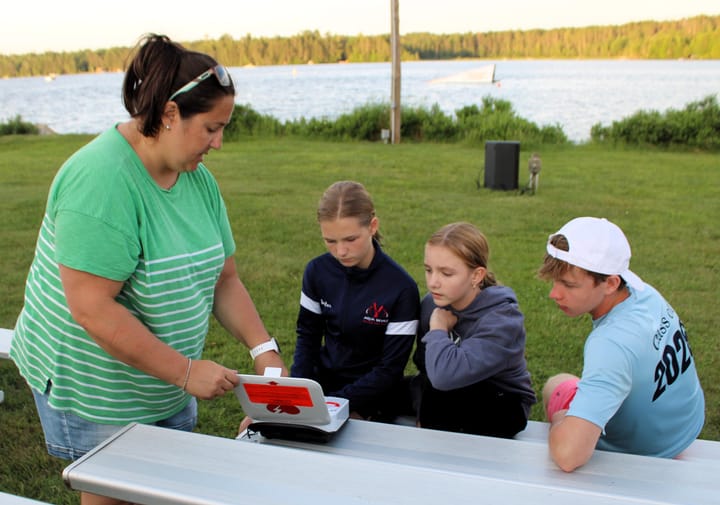Local Bans May Be the Only Way Forward in the Fight Against Wake Boats on Area Lakes

Wake boats again dominated the subject matters discussed at the May 6 listening session in Eagle River City Hall with state reps. Rob Swearingen and Mary Felzkowski.
It's not for lack of trying, but Felzkowski said a few times throughout the discussion that protection of local waters may very well come down to towns taking it upon themselves to draw up regulatory ordinances for their lakes.
The space allotted at city hall was standing room only with the sixty-plus people in attendance. Some individuals spent the hour-long meeting leaning in doorways, and there was a small group of overspill into the chambers behind the main meeting room.

This was one of four listening sessions held around the Northwoods, with others taking place in Manitowish Waters, Minocqua and Rhinelander on May 5-6.
To kick off the meeting, the two legislators greeted the group. Swearingen noted that he encouraged the discussion of wake boats, but noted they were not the focus of the meeting and "hoped for other conversation topics as well."
Felzkowski and Swearingen had been working on legislation to control wake boat use during their last session but failed to ink a deal, which Swearingen recapped in his introduction.
"Mary and I worked diligently last session on a bill we had both sides to the table, we were 'this close' to getting it done. It came down to about a 300-foot mark and both sides walked away," Swearingen said. "Since then, neither of us has been involved in any additional conversation. Both sides went to different authors. I absolutely have no idea what they're talking about."
Most of the comments brought forth on the topic were from people concerned about the ecological effects of the boats on our area lakes, with many citing shoreline damage, the spread of aquatic invasive species, and the large waves causing safety issues for swimmers, paddlers and others using the lake as major concerns.
The operating distance from shore remains a big sticking point in locking down a bill, and ultimately was the main reason the last round of legislation failed. Felzkowski noted that coming up with legislation that works for the larger lakes in the southern part of the state like Lake Geneva, up to the Chain of Lakes in Manitowish Waters, and everything in between has been one of the major challenges.
A resident on Black Oak Lake in Land O' Lakes said he thought 500-600 feet from shore would be an acceptable distance, which Felzkowski responded to saying they had negotiated up as high as 300-plus feet with the powersports industry during their original talks.
"We looked at all the lakes in the state of Wisconsin, and if we went to that 700 feet, or even the 500 feet that you want, we now concentrated these wake boats down to about 63 lakes in the state of Wisconsin. Now, if I'm a state senator or I'm a representative of one of those 63 lakes — do you think I'm voting if I just concentrated wake boats on my lake? The answer to that is 'no.' Because then they would be tarred and feathered by their constituents. This isn't a cop-out; this is reality.
"So what we have to come up with is something that works for all. So maybe we get to 300 feet, 400 feet, but then the local control is where you're going to have to ban them. I mean, that's what I'm thinking might be the outcome of this," Felzkowski said, adding that there are also people within her legislature that do not want to ban wake boats.
There were a couple comments in favor of wake boats, with one resident on Big Fork Lake in Three Lakes defending the use of these boats and the manners of wake boat owners on local waters.
"If someone is fishing, somebody is kayaking, somebody is paddleboarding, we give them room, we stop, we let them go. We stay in the middle of the lake — which is where wake boats should be used," he said. "We respect everyone else on the water and we ask for the same thing for us as well. The people we hang out with and are friends with, they all have the same respect for the lakes that we do."

Swearingen interjected there are certainly some "bad players" on wake boats, saying a lot of it comes down to education and being a good steward of the lake. Others agreed that — like any recreational sports here — there are always a few bad apples that can spoil the whole bunch.
"We have responsible wake boat owners, and those are usually the people that live on the lake because it's their friends, it's their neighbors," Felzkowski said. "And then there are the people that come up with their wake boats and rent an AirBNB. It's not the same."
Another speaker who lives on Catfish Lake spoke up about the change in demographics in the area over the last few years, noting the rental homes have changed from what used to be small cottages, into much larger homes. He expressed his distaste for wake boats, but added that they are not the only boats causing problems on the waterways now.
"Do I like them (wake boats)? No. But I spend a lot of time on the water. There's hundreds of pontoon boats with 300-horse motors driving through the weed beds, wide open, causing just as much damage to piers, shores, people paddleboarding. I'm not disagreeing with what a wake boat can do, but the demographics have changed."
He also spoke to the lack of available enforcement, especially with the big increase in boating activity seen on the Chain and other waterbodies in recent years. "We have one warden covering a big area. The sheriff's department is out two days a week in the summertime — they're limited on manpower. To address this issue, a lot of things have to change," he said.
Felzkowski noted the DNR, which was part of the recent talks to pass legislation, also cited enforcement as an issue. The department had originally stated it did not want lake depth to be part of the legislation because they said it was not enforceable if tickets were to be taken to court, according to Felzkowski.
Allen Wirth, Vilas County conservationist, brought up two points to the legislators regarding the differing ecology of lakes in northern Wisconsin versus southern Wisconsin, and also pointed out that protection is far less expensive than fixing the damage after it's been done when considering a budgetary standpoint.
Felzkowski agreed that everyone there had the same goal; to protect our beloved lakes and the integrity of northern Wisconsin. She has organized a meeting coming up May 28 that will bring both sides to the table to discuss the topic again, in the hopes that a resolution will be able to be reached in the next couple years.
"I have asked Lakes at Stake, which represents a lot of people in the northern part of the state, along with the power sports industry, and now there's a third group that's been formed," Felzkowski said. "Now, they do not want probably what most of you in this room want — they are active wake boat people. They have formed a group, and it's a pretty powerful group."
She has invited all three groups to the table to try to compromise and find a resolution that everyone can live with, but noted that it may very well come down to local towns having to take it upon themselves to ban use of these boats where they don't want them.
Other Topics
Speakers brought up federal funding freezes and other actions a number of times as well as actions taken by President Trump, but Swearingen and Felzkowski said they would not speak about federal issues as they were state representatives focusing on state issues.
A request also was made to consider adding civil legal aid to the budget as these types of organizations are struggling because of federal uncertainty, and concerns were raised about the use of county deer advisory councils for whitetail deer management.
Veterans' Services
Doug Schultz of Sayner — a veteran himself — brought up worries about cuts made to various important veterans' administrations in charge of programming and outreach that he believes is much needed. He also voiced concerns about military veterans that are women and people of color being taken out of the Wisconsin Veterans Museum in Madison.
"Every staff member that loses a job in veterans' administration — the effect is that you potentially lose another veteran to suicide," Schultz said. "I feel a lot of these veterans that commit suicide can be saved."
Felzkowski and Swearingen responded that the state has many programs in place and will continue those programs to help the people who have put their lives on the line for our country. Neither representative had heard anything of changes being made to the museum.
"Wisconsin has some of the broadest veteran benefits of any state in the nation," Felzkowski said. "We value and honor the veterans in this state." Swearingen also gave props to Vilas and Oneida counties' Veterans Service Offices for doing "a fantastic job."
FDA Quality Control Issues
One woman voiced her concerns regarding staffing cuts to the Food and Drug Administration (FDA) which she said could impact inspections and quality control of Wisconsin's dairy industry, controlling underage nicotine sales to minors, as well as medications and issues surrounding bird flu.
She alleged there had been a 20% reduction in FDA staff, which could lead to "very little control coming our way for milk and dairy" as it's being pushed down to states. "So one of the concerns that I have is how are we as a state going to protect our constituents here with the quality of milk and products like that?
She cited medication safety as a concern, as well as the possible slower approvals of drugs and life-saving procedures. On the subject of bird flu, the speaker noted that pets and humans can be affected by the illness, as can all the people who consume meat or eggs, or work with those products.
"We have a lot of poultry, dairy farms in Wisconsin. Not everyone is a meat eater but it does affect people's animals because any poultry, eggs, raw pet food — any people working with those products also are exposed to bird flu. We now have very little oversight," she said.
Felzkowski requested she share some of her sources of information so she could follow up on these claims and reach out to the Department of Agriculture, Trade and Consumer Protection for clarification and next steps.
School Funding
Scott Foster, district administrator of Northland Pines School District, urged the legislators to consider small rural schools like Northland Pines to provide important programs and resources in the upcoming budget.
He spoke on a number of recent courses and programs the school has instituted, including expanding the Building and Trades courses to students in the Three Lakes School District, as well as sharing firefighting and emergency medical technician courses with the neighboring district.
Foster also highlighted the lack of mental health services for students, and talked about Pines' Connect Learning Center for students that cannot regulate and are disrupting all students.
That's making a difference, but the need is getting bigger than the program. We need resources to help continue these programs. They are not a want — they are a need," Foster said.
"We are fortunate to have a fantastic sheriff and county board who has worked with us to have school resource officers which we believe in because they are pro-advocate. All these things cost our taxpayers more money."
Foster noted that the game is not level with school funding right now, with some districts getting way more than others.
"I think we have great things going but it's hard to maintain them with the current funding," he added. "The neighboring district gets $1,000 more per kid and gets state funding, and we get none. We're starting $1,000 less in this district than anybody else, and we don't get state funding."
Foster thanked the legislators for always being here and listening and working together.
Swearingen congratulated Foster on his upcoming retirement which will take effect June 30, 2026.



